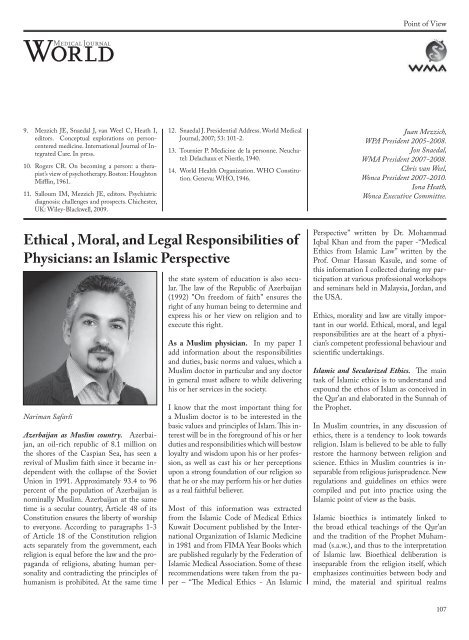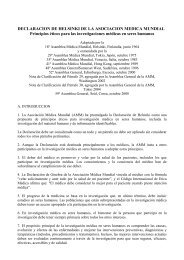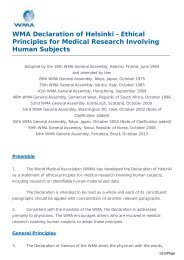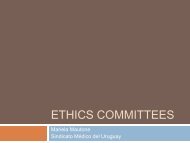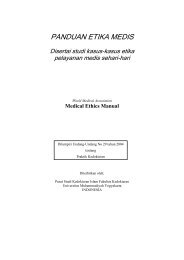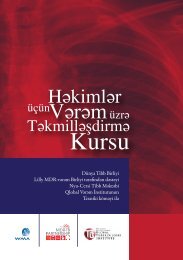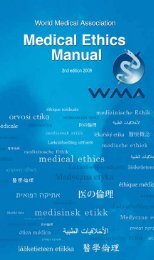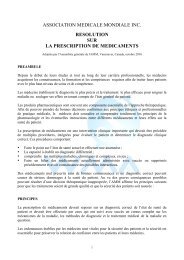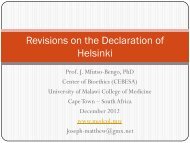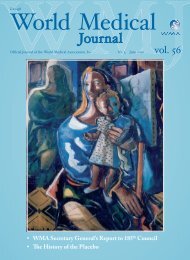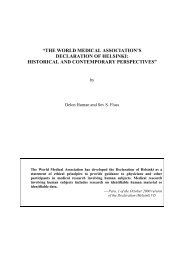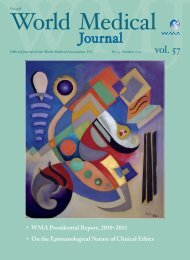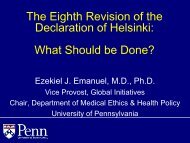wma 7-2.indd - World Medical Association
wma 7-2.indd - World Medical Association
wma 7-2.indd - World Medical Association
Create successful ePaper yourself
Turn your PDF publications into a flip-book with our unique Google optimized e-Paper software.
Point of View<br />
9. Mezzich JE, Snaedal J, van Weel C, Heath I,<br />
editors. Conceptual explorations on personcentered<br />
medicine. International Journal of Integrated<br />
Care. In press.<br />
10. Rogers CR. On becoming a person: a therapist’s<br />
view of psychotherapy. Boston: Houghton<br />
Mifflin, 1961.<br />
11. Salloum IM, Mezzich JE, editors. Psychiatric<br />
diagnosis: challenges and prospects. Chichester,<br />
UK: Wiley-Blackwell, 2009.<br />
12.<br />
13.<br />
14.<br />
Snaedal J. Presidential Address. <strong>World</strong> <strong>Medical</strong><br />
Journal, 2007; 53: 101-2.<br />
Tournier P. Medicine de la personne. Neuchatel:<br />
Delachaux et Niestle, 1940.<br />
<strong>World</strong> Health Organization. WHO Constitution.<br />
Geneva: WHO, 1946.<br />
Juan Mezzich,<br />
WPA President 2005-2008.<br />
Jon Snaedal,<br />
WMA President 2007-2008.<br />
Chris van Weel,<br />
Wonca President 2007-2010.<br />
Iona Heath,<br />
Wonca Executive Committee.<br />
Ethical , Moral, and Legal Responsibilities of<br />
Physicians: an Islamic Perspective<br />
Nariman Safarli<br />
Azerbaijan as Muslim country. Azerbaijan,<br />
an oil-rich republic of 8.1 million on<br />
the shores of the Caspian Sea, has seen a<br />
revival of Muslim faith since it became independent<br />
with the collapse of the Soviet<br />
Union in 1991. Approximately 93.4 to 96<br />
percent of the population of Azerbaijan is<br />
nominally Muslim. Azerbaijan at the same<br />
time is a secular country, Article 48 of its<br />
Constitution ensures the liberty of worship<br />
to everyone. According to paragraphs 1-3<br />
of Article 18 of the Constitution religion<br />
acts separately from the government, each<br />
religion is equal before the law and the propaganda<br />
of religions, abating human personality<br />
and contradicting the principles of<br />
humanism is prohibited. At the same time<br />
the state system of education is also secular.<br />
The law of the Republic of Azerbaijan<br />
(1992) "On freedom of faith" ensures the<br />
right of any human being to determine and<br />
express his or her view on religion and to<br />
execute this right.<br />
As a Muslim physician. In my paper I<br />
add information about the responsibilities<br />
and duties, basic norms and values, which a<br />
Muslim doctor in particular and any doctor<br />
in general must adhere to while delivering<br />
his or her services in the society.<br />
I know that the most important thing for<br />
a Muslim doctor is to be interested in the<br />
basic values and principles of Islam. This interest<br />
will be in the foreground of his or her<br />
duties and responsibilities which will bestow<br />
loyalty and wisdom upon his or her profession,<br />
as well as cast his or her perceptions<br />
upon a strong foundation of our religion so<br />
that he or she may perform his or her duties<br />
as a real faithful believer.<br />
Most of this information was extracted<br />
from the Islamic Code of <strong>Medical</strong> Ethics<br />
Kuwait Document published by the International<br />
Organization of Islamic Medicine<br />
in 1981 and from FIMA Year Books which<br />
are published regularly by the Federation of<br />
Islamic <strong>Medical</strong> <strong>Association</strong>. Some of these<br />
recommendations were taken from the paper<br />
– “The <strong>Medical</strong> Ethics - An Islamic<br />
Perspective” written by Dr. Mohammad<br />
Iqbal Khan and from the paper -“<strong>Medical</strong><br />
Ethics from Islamic Law” written by the<br />
Prof. Omar Hassan Kasule, and some of<br />
this information I collected during my participation<br />
at various professional workshops<br />
and seminars held in Malaysia, Jordan, and<br />
the USA.<br />
Ethics, morality and law are vitally important<br />
in our world. Ethical, moral, and legal<br />
responsibilities are at the heart of a physician’s<br />
competent professional behaviour and<br />
scientific undertakings.<br />
Islamic and Secularized Ethics. The main<br />
task of Islamic ethics is to understand and<br />
expound the ethos of Islam as conceived in<br />
the Qur’an and elaborated in the Sunnah of<br />
the Prophet.<br />
In Muslim countries, in any discussion of<br />
ethics, there is a tendency to look towards<br />
religion. Islam is believed to be able to fully<br />
restore the harmony between religion and<br />
science. Ethics in Muslim countries is inseparable<br />
from religious jurisprudence. New<br />
regulations and guidelines on ethics were<br />
compiled and put into practice using the<br />
Islamic point of view as the basis.<br />
Islamic bioethics is intimately linked to<br />
the broad ethical teachings of the Qur'an<br />
and the tradition of the Prophet Muhammad<br />
(s.a.w.), and thus to the interpretation<br />
of Islamic law. Bioethical deliberation is<br />
inseparable from the religion itself, which<br />
emphasizes continuities between body and<br />
mind, the material and spiritual realms<br />
107


